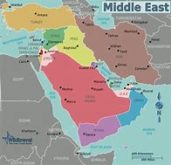iranintl – Responding to overnight attacks on the positions of an Iran-backed group in Iraq, an analyst told Iran International that Israel is trying to stop Tehran’s proxies from joining the conflict.
“Iran’s proxy forces can retaliate to the recent strike on [airbase in] Esfahan and Israel wants to prevent that from happening,” said Masoud Alfak, adding that “Israel now sees the best defense in an offense.”
On Friday, explosions were heard in Esfahan’s 8th Shekari Air Base as Israel reportedly launched a widely anticipated strike in retaliation to a large-scale Iranian missile and drone attack over the weekend.
In less than 24 hours, airstrikes hit the headquarters and a major base of Iran-backed Hashd al-Shaabi militia (Popular Mobilization Forces) in the Babylon governorate of eastern Iraq to the south of the capital city, Baghdad.
According to Alfak, a vast network of hybrid warfare is currently underway between Israel and Iran and its proxies in the region. “Israel considers Tehran-backed proxy groups as part of its conflict with Iran.”
The Dubai-based analyst remarked that as long as the war in Gaza continues and Iran-Israel tensions persist, Tehran-backed proxies will continue their destabilizing actions in the region and will refuse to stay peaceful.
No one has claimed responsibility for the overnight strikes on Hashd al-Shaabi positions in Iraq. In a post on X, the US Central Command (CENTCOM) dismissed reports that Washington had a part in the operation. Citing an unnamed Israeli official, CNN reported that Israel also denied involvement in the incident.
For months after the start of the Israel-Hamas war on October 7, the Iranian government avoided direct involvement in the conflict and used its proxies such as Yemeni Houthis,Hashd al-Shaabi, and Hezbollah to target Israeli and American interests in the region.
Tensions between Iran and Israel have risen sharply over the past weeks. On April 1, Israel launched a precision missile strike on Iran’s consulate building in Damascus, including Mohammad Reza Zahedi, the highest-ranking commander of the Iranian Revolutionary Guards Quds Force (IRGC-QF) in Lebanon and Syria. In retaliation, Iran launched its first ever direct strike against Israeli territory on April 14 with more than 350 drones and cruise and ballistic missiles.
In a post on X, Jason Brodsky, Policy Director at United Against Nuclear Iran (UANI), attributed the overnight strikes in Iraq to Israel. “On April 17, Iraq’s national security advisor Qasim Al-Araji, a member of IRGC terrorists-backed Badr Organization, said Iran’s regime’s attack on Israel on April 13 created ‘a new deterrent policy’ in the region. And this is Israel’s response to him tonight in Iraq,” Brodsky pointed out.
Since October 7, Iran-backed forces in Iraq have been threatening to target Israel. Their anti-Israel rhetoric intensified after the April 1 attack in Damascus. Following the incident, the Iranian proxies in Iraq claimed two drone attacks on Israeli territory, one in Haifa and another in Golan Heights.
Furthermore, Tehran-backed Iraqi Hezbollah voiced its readiness to arm and equip 12,000 forces of “the Islamic resistance” in Jordan, threatening that country’s stability and the Hashemite kingdom.
“This threat is about opening a broad front against the Zionist regime, which is probably the most dangerous of all fronts because it could geographically threaten all the cities of the occupied territories and could facilitate attacks against many of the most sensitive targets, including Tel Aviv and [Israel’s] nuclear facilities,” Iranian semi-official news agency ISNA reported on April 4.
 Shabtabnews In this dark night, I have lost my way – Arise from a corner, oh you the star of guidance.
Shabtabnews In this dark night, I have lost my way – Arise from a corner, oh you the star of guidance.



